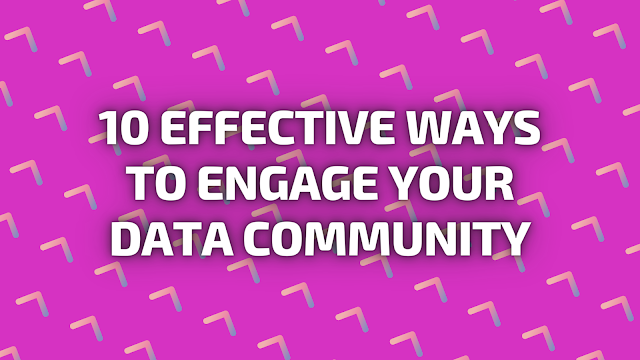Whether you are running an internal Alteryx user group, leading an external Tableau user group, building a center of excellence, creating a data literate organization, or anything in between, engagement is critical to success. You likely want others to contribute, either through giving presentations, sharing examples, or asking questions.
Tableau Visionary Sarah Bartlett recently wrote a blog post for the Data Leadership Collaborative that speaks to change management as it relates to data analytics. Sarah’s post, along with an email from a member of my local Tableau User Group asking for advice on starting an internal TUG, was the inspiration for this post.
Below are my tips for engaging with your data community, but before we jump in, here are a few other resources that might be helpful:
- Starting a Tableau User Group (TUG) (in this post I outline my process)
- Killer Ideas for your Next User Group Meeting (different ways to engage attendees)
- Data Book Recommendations For Your Journey (there's a great one for community builders)
Provide examples
While technical product demos are nice, they can feel like a sales pitch for community members. Instead, the most meaningful demos are ones from real people, working with real data, making a real impact. Find real-world use cases to highlight.
Connect the dots
Often, a demo or example is just the starting point and there are many ways to implement the concept. It’s important to help your data community understand the possibilities and not get stuck in a single use case. Explain the fundamentals of the concept, give multiple examples, and ask for perspectives from others. Oh, and make sure to keep it industry-specific if you’re working internally, or cover many industries if you’re working externally.
Get input
It can be easy to feel like you have to have all the answers if you’re the subject matter expert or group leader, but we are all continuously learning. It’s important to model that behavior as well. Post a dashboard you’re working on and ask for feedback or ask the group for their opinion on a certain topic. The bit I find the hardest is to be comfortable with the silence following the question.
Select a theme
When running a user group meeting, or building up data literacy at an organization, having a theme for an event or limited timeframe provides a nice guide as you curate content. Not only will the content being shared flow nicely, community members will be in the right frame of mind and more easily be able to focus on the information being shared.
Make it personal
As lovely as it would be for someone to step up and offer to present their work, this rarely happens. Instead, I’ve found it most effective to personally ask someone to present on a specific topic (one associated with the theme). Framing the ask in narrow terms helps because it’s a topic that they have been personally selected to speak about.
Be specific
When asking someone to present or demo their work, I usually ask for a 15-minute presentation, because that amount of time doesn’t seem as daunting as a 30-minute presentation. If you add time for Q&A at the end, the presentation could easily fill 30 minutes.
Incentivize
I won’t lie to you, I bribe people to ask questions. Random winners are selected from those who participate in conversations. I use this tactic at user group meetings and internal events as well.
Vary activities
I’m always trying to come up with new and exciting ways to engage my data community. Though user group meetings always follow the same format, I try to mix up the activity to keep things fun. Sometimes we use Zoom breakout rooms to brainstorm ideas, other times we’ll play trivia, etc. Similarly, I like to have multiple speakers during an event to keep things from getting monotonous.
Recognize excellence
In situations other than user groups, I try to highlight data champions and to work they’re doing within an organization. This spotlight not only recognizes their work, but also makes them a resource for others who might be interested in doing a similar project.
Create connections
One of the best feelings as a community leader is when two members of your community share ideas between each other. Everyone has a valuable perspective and getting people to share theirs is a challenge, but when they become a resource for others and ideas are exchanged, magical things can happen. As much as I can, I try to facilitate small group discussions so users can create direct relationships with each other.
